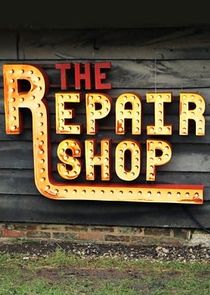The Repair Shop S2023E27 - Windrush Special

Sinopse
To mark National Windrush Day, the team fixes four items that celebrate the contribution and achievements of members of the Windrush generation and their descendants.
First into the barn is Beverley, with a memento that tells a tale of her father's heritage. The British passport was issued to Beverley's father, Edgar, in Jamaica in 1948 and served as his legally binding document to come to the UK to help rebuild the ‘Mother Country' after the Second World War. In 1950, he travelled on the SS Eros, and after settling in London, he sent for Beverley's mother who travelled from Jamaica to be reunited with him. The passport has been cherished for nearly 80 years but is sadly now showing its age. Beverley hopes bookbinder Chris Shaw can restore it to remind her elderly dad of his pioneering bravery, moving and settling in a new country as a young man.
Next to arrive is Keithly, with a suitcase owned by his trailblazing mother, Locita. Known as a grip, the case holds memories of a journey filled with opportunity, adventure and resilience. Locita travelled from the island of Nevis to the UK in 1956. The journey was arduous, with Locita spending a long time aboard the SS Irpinia on very rough seas before eventually docking in Southampton. She started her life in the UK in menial jobs, but her tenacity and drive meant she worked and studied hard, eventually becoming a local councillor in Manchester and helping many in the community. Keithly is now hoping the barn's leather expert Suzie Fletcher can repair the grip so that Locita can take it back to the West Indies with her when she returns later this year.
Next, sister and brother Dorcas and Stephen have brought a precious clock for the attention of the barn's horologist, Steve Fletcher. The clock belonged to the siblings' parents, Hermann and Keturah, and was one of the first items they saved up to buy after arriving in the UK from Antigua. The plan was to stay for five years and return home. However, the couple soon put down roots and ended up remaining in the UK for the rest of their lives. The pair worked hard and went from living in a single bedroom in a shared house to eventually owning their own home in Birmingham. The chiming clock took pride of place in their front room and served as a status symbol of the fact that they had ‘arrived' and established themselves. Now the siblings would love to hear the broken chime ringing again to remind them of their parents' tenacity and what they did to not only help rebuild the UK but also to build a new life for subsequent generations of their own family.
The barn's final visitor is Patrick Vernon OBE, who led a successful campaign for 22 June to be recognised annually as Windrush Day. He's brought along a radiogram that once belonged to his late friend Eddie Noble, a Second World War British-Jamaican veteran who settled in the UK following his service in the RAF. The radiogram was one of Eddie's most prized possessions, and he gifted it to Patrick in his later years. Electrical whizz Mark Stuckey acts with military precision to get the radiogram back to its former glory.
Informações
- Status: Transmitido
- Data de Exibição: 21/06/2023
- Emissora:
 BBC One
BBC One